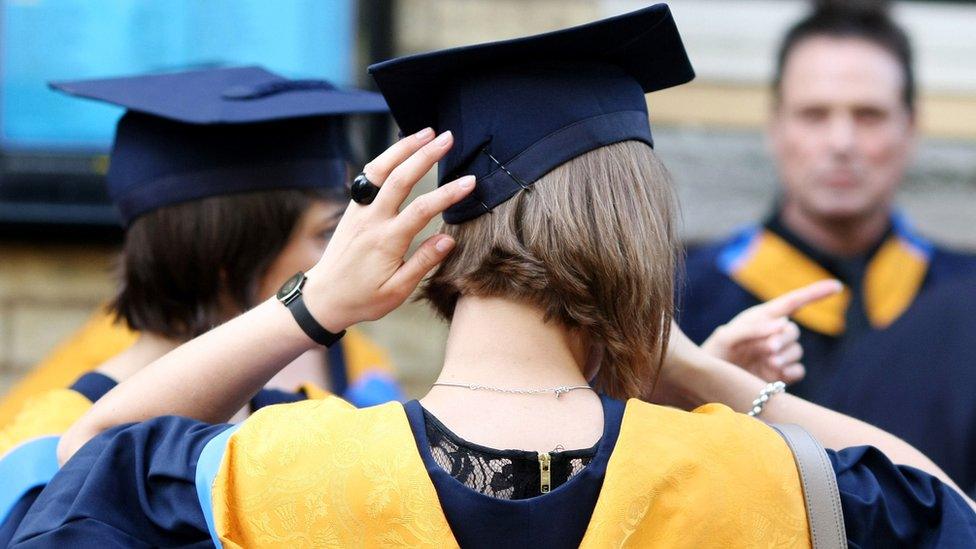Welsh Election: University tuition fees - what the parties are offering
- Published

Student Jamie Cross said the government, not universities, were to blame
Frustrated at the impact of the pandemic on his studies, Jamie Cross took matters into his own hands.
The Penarth film student has launched a campaign with friends to secure compensation for university students.
With the value of tuition fees being questioned, some parties are promising to cut fees for certain students if they win the Welsh Parliament election.
But this would put the viability of universities in doubt, a former vice-chancellor has warned.
Jamie, 22, and fellow students in Bristol, launched Write Off Write Now (WORN) after what they say is an unfair decision to charge full fees for those studying remotely during lockdown, when in-person classes have been limited.
"If you're paying an awful lot of money for a service and they're not able to deliver it, people are going to start complaining," he said.
"If you're paying for wi-fi and the service you're getting is rubbish, you phone your provider and ask either for money back or for them to drastically improve the way they're performing, otherwise chances are you're going to leave that provider. I see universities exactly the same."
In England, students pay up to £9,250 a year. In Wales it's £9,000 though most students take up loans which are only repaid once their earnings reach a certain level.
The UK and Welsh governments have previously rejected calls for blanket fee rebates.
Historically a contentious political issue, tuition fees are in the spotlight again in this week's Senedd election due to the pandemic.

Most higher-education learning remains online
What the parties say
The Welsh Conservatives would introduce a compensation scheme for students whose courses have been disrupted over the past year.
Beyond the pandemic, they would also halve fees for Welsh students studying science, technology, engineering or maths (STEM) and modern foreign languages at Welsh universities.
They would also refund tuition fees for those who choose to work for at least five years in Wales as doctors, nurses or teachers after their studies.
Plaid Cymru pledges to lower the maximum fee for students living in Wales and who study at Welsh universities to £7,500 - a step towards the long-term goal of making university education free.
Neither Labour nor the Liberal Democrats are offering to cut tuition fees.
However, Welsh Labour says Wales has the most generous student support system anywhere in the UK, based on evidence that up-front living costs was the biggest barrier to young people going to university.
The Lib Dems say plans to reduce tuition fees risk underfunding universities and that a system based on support for living costs, introduced by their education minister Kirsty Williams, has seen record numbers of disadvantaged pupils applying to university.

SIGN UP FOR WALES ALERTS: Get extra updates on BBC election coverage

Former university vice-chancellor Professor Sir Deian Hopkin, a member of the Higher Education Commission, said those people calling for a cut in fees must consider how universities will be funded.
"Any discussion of reducing the income of universities, raises fundamental questions about their sustainability," he said.
"There has been concern about the level of debt that students incur and that's stimulated a debate about the level of fees in the future."
But he added there was "no real evidence" that the level of fees deter students from applying.
"So you have to ask, if students are quite content to accept this, what kind of provision do you make for them? What kind of support do you give them to justify those fees rather than reducing the fees themselves?"

Lowering tuition fees would encourage Welsh students to apply to Welsh universities, says Elain Gwynedd
Elain Gwynedd, from Anglesey, is in her first year studying Welsh at Aberystwyth University - and the 18-year-old said lowering tuition fees would be attractive.
"It would definitely make more students want to stay in Wales if it was cheaper, but I know I wanted to come to Aberystwyth right from the start," she said.
"If someone told me, if you go to Liverpool it would be £7,500, I'd still want to go to Aber.
"It's a lot of money, but I would rather be happy somewhere I wanted to be, rather than somewhere that I didn't really want to go because it was cheaper."

Rhydian Cleaver fears students face a "trade off" between the cost and quality of education
Rhydian Cleaver, 21, from Swansea, is a third-year politics student at London School of Economics.
As a low-income student, he said fees were "one of the key priorities" for him, while also selecting a course with the best job prospects.
But he felt many students faced a "trade off" between costs and the quality of education.
"I was able to get the security that I was at a university that was a little more tailored to what I wanted to do, maybe more competitive and offered things that weren't available in Wales," he said.

NUS Wales President Becky Ricketts said education funding was "unsustainable"
The president of the National Union of Students in Wales welcomed any discussion about tuition fees in this week's election.
"There is no reason why Wales can't take the lead on this, why Wales can't stand up and have a discussion around tuition fees and around the marketization of our education system," said Becky Ricketts.
But she agreed that cuts to fees must go hand-in-hand with additional funding for institutions.
"There has to be a discussion around making sure universities don't lose out - making sure they are able to offer those courses to students".
Jamie said he could see the benefits of incentives to stay in Wales but felt STEM subjects should not be favoured over creative paths.
"We need to hold parties responsible for their promises and make sure no party creates empty incentives that try to win over the student vote then don't get delivered," he said.

POLICY GUIDE: Who should I vote for?
FIRST TIME: Will 16-year-olds vote?

- Published30 April 2021

- Published28 April 2021

- Published10 September 2021

- Published14 April 2021

- Published8 April 2021

- Published17 March 2021

- Published15 March 2021

- Published3 February 2021

- Published21 January 2021

- Published18 January 2021

